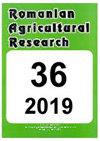罗马尼亚摩尔达维亚中部条件下混合系统临时草甸开发研究
IF 1
4区 农林科学
Q3 AGRONOMY
引用次数: 0
摘要
对临时草甸的研究具有特别重要的科学意义,因为它们使我们有可能对生态系统的多样性、稳定性和成熟度之间的关系的某些基本方面进行启发和描述;物种之间的关系;自然生态系统与人工生态系统之间的生物平衡;现在备受争议的方面。它们可以取代退化的永久草地,或取代用作饲料的可耕地。在制造混合物时,必须考虑的基本要求是它们形成均匀的草皮,并能很好地适应固定条件。开发临时草甸的重要性促使ARDS Secuieni从2017年开始进行研究,目的是创造适合该地区土壤气候条件的最佳混合物。在中央摩尔达维亚条件下获得的结果表明,与未施肥的变异品种相比,施用不同剂量的肥料对干物质的产生有影响。饲喂N80P40 kg/ha的品种饲料产量最高,达16.13 t/ha d.m;与对照组相比,差异相当显著;控制变量(N0P0)的产量最低,为9.47 t/ha d.m。分析得到的数据不难发现,在所研究的变量中,有5个生产岩屑;交替割草与模拟放牧(混合制度)。对第一次采伐所得结果进行分析,关于施肥和混合施用对禾草和豆科植物比例的影响,发现85%禾草(Dactylis glomerata 60% + perenne Lolium 25%)和15%多年生豆科植物(Lotus corniculatus 15%)混合施用时,N40P40和N80P40分别为64.5%和86.0%。N80P40和N40P40分别为12.7%和34.6%,各物种的参与比例在0.5% ~ 1.4%之间。多年生禾草和豆科植物的参与比例随施肥剂量而变化,所研究的所有混合物的饲料质量都很好,这主要取决于施肥剂量,但也取决于2017 - 2020年中部摩尔达维亚条件下的物种及其参与播种率的比例。本文章由计算机程序翻译,如有差异,请以英文原文为准。
Research on the Exploitation of Temporary Meadows in a Mixed System under the Conditions of Central Moldavia, Romania
The study of temporary meadows is of particular scientific importance, because they make possible the edification and characterization of some essential aspects regarding the relationship between the diversity, stability and maturity of ecosystems; the relationships between species; the biological balance between natural and artificial ecosystems; aspects that are greatly debated nowadays. They can replace degraded permanent meadows, or on arable land intended for fodder. When creating the mixtures, the basic requirement that must be taken into account is that they form a uniform grass cover and are well adapted to stationary conditions. The importance of developing temporary meadows led to the initiation of studies at ARDS Secuieni, starting with 2017, with the aim of creating the best mixtures adapted to the pedo-climatic conditions in the area. The results obtained in the conditions of Central Moldavia showed that fertilization with different doses of fertilizer influenced the production of dry matter compared to the non-fertilized variants. The variant fertilized with the dose of N80P40 kg/ha had the highest fodder production, i.e.16.13 t/ha d.m.; the difference compared to the control was quite a significant one; and the lowest production was obtained with the control variable (N0P0), i.e. 9.47 t/ha d.m. Analysing the data obtained, it can be easily noticed that, in the variants studied, there were five production cuttings; alternating hay mowing with that for simulating grazing (mixed regime). Analysing the results obtained, for the first cutting, regarding the influence of fertilization and the mixture used on the percentage of grass and leguminous species, it was found that in the mixture of 85% grasses (Dactylis glomerata 60% + Lolium perenne 25%) and 15% perennial leguminous (Lotus corniculatus 15%), the percentage of grasses participation in the grass cover was between 64.5% for the variant fertilized with N40P40 and 86.0% for the variant fertilized with N80P40. The leguminous that are part of the grass cover were between 12.7% for the variant fertilized with N80P40 and 34.6% for the variant fertilized with N40P40, and the percentage of participation of various species was between 0.5% and 1.4%. The participation percentage of perennial grasses and leguminous varied depending on the dose of fertilizer applied, and the quality of the fodder obtained was good for all the mixtures studied, being primarily determined by the doses of fertilizers administered, but also by the species and the proportion of their participation in the sowing rate under the conditions of Central Moldavia from 2017 to 2020.
求助全文
通过发布文献求助,成功后即可免费获取论文全文。
去求助
来源期刊

Romanian Agricultural Research
农林科学-农艺学
CiteScore
0.90
自引率
28.60%
发文量
2
审稿时长
>12 weeks
期刊介绍:
The Journal ROMANIAN AGRICULTURAL RESEARCH is an “open access” one, which publishes original articles, short communications, presenting new scientific results – theoretical, experimental and technical – on plant breeding and genetics, physiology, biotechnology, mineral nutrition and plant protection, in field crops. Reviews on up-to date subjects and recent research, preferably from Eastern Europe, may also be published.
 求助内容:
求助内容: 应助结果提醒方式:
应助结果提醒方式:


